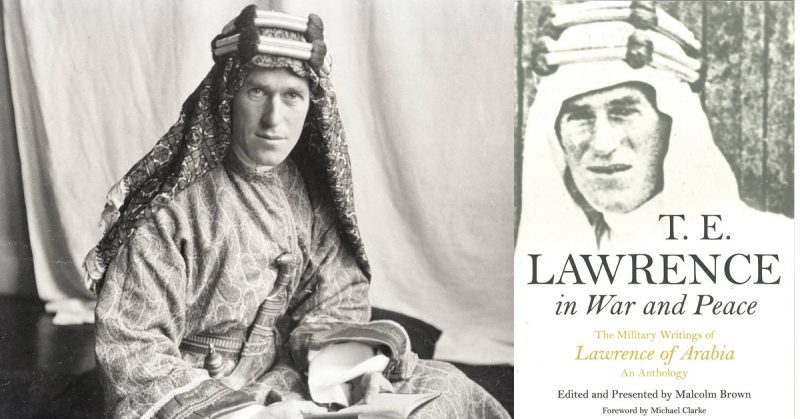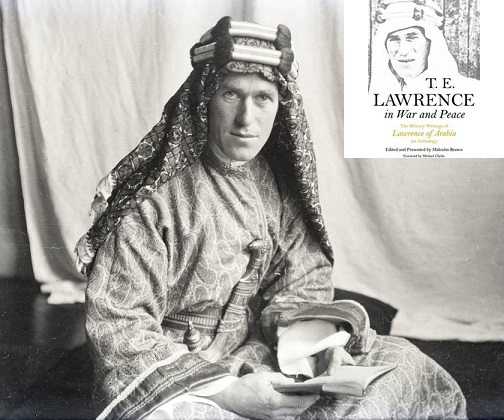If you drive towards the Armour Centre at Bovington from the direction of Dorchester you will pass Clouds Hill, the last home of the singularly brilliant
Thomas Edward Lawrence. He remains a divisive figure whose reputation is batted about in a game of Swingball by people arguing over his importance to the Arab campaign against the Turks and his place as a military visionary. Lawrence remains inconvenient for some and a giant for others. It is a debate that will continue for years to come. This book edited and presented by Malcolm Brown brings us Lawrence’s contemporary writings from the period and gives us a deeper insight into his undoubted genius. Whether it was as a writer, an archaeologist, adventurer, historian or soldier – or perhaps all five – is for the reader to assess.
The bulk of Mr Brown’s effort is in producing Lawrence’s contributions to the Arab Bulletin, a series of secret reports, summations and pen portraits put together to help the British establishment understand what was happening in Arabia and get a grip on the people they were dealing with. Lawrence’s writing is really quite stunning and immensely beautiful. The much younger me bought a copy of his classic Seven Pillars of Wisdom expecting it to be a derring-do filled account of blowing up trains and making camel charges on Turkish outposts. While there is plenty of combat, the book’s intense intellectualism and seemingly dense prose defeated me. I simply didn’t have enough grasp of my own language to appreciate it. Perhaps this betrays the problems Lawrence has faced, then and now. He seems to me to have been on an intellectual level way beyond many of his so-called peers. He had vision and the ability to disseminate everything around him from the flora and fauna to religion and military strategy without missing a beat. His eloquence and descriptive power might have made him one of the greatest authors who ever breathed. But he rejected these notions and went off to play with tanks, motorcycles and motor launches but failed to secure the anonymity he craved.
This book is effectively a kind of ‘Seven Pillars Lite’ because much of the work here formed the foundations of the great book. Whether you would choose to read this, instead, is a moot point; but there is much to learn here and whether you are in the camp of those seeking to underplay his importance or with those who think he was a visionary, the Lawrence we get is a genuinely impressive individual. Whether you would like him is another matter.
It has become fact that much of Lawrence’s understanding of the region, it’s politics and the complicated structure of Arab society and religious observance was as prescient in 1916-18 as it should have been in 2003 when Bush and Blair’s adventurism ignored just about everything that had been learned nearly a century earlier. Back in the Great War, the imperialists in London, Delhi and Paris were often just as keen to ignore inconvenient facts in the face of their ambitions. I have no intention of entering a debate on the rights and wrongs of recent history but the capacity to unlearn things on the part of our leaders and establishments is staggering. All you have to do is read Lawrence’s Twenty-seven points to confirm much of this.
Please don’t take from this the idea that I am a huge fan of Lawrence blind to his failings. Like Churchill, Douglas Haig, Arthur Harris and Monty he remains a fascinating figure and these most important and argued over men are a continuous cause of study and interest for me.
There is so much more to Lawrence than a one-dimensional figure of a diminutive white robed warrior charging on his camel. He was a multi-faceted genius at home in freezing deserts or tinkering with powerful motorcycles in the Dorset sunshine. This book opens him up to the general reader. Beyond the superb scene setting by Mr Brown it allows us to get to grips with how Lawrence thought and acted without the interpretations of others. There are many superb books to read where Lawrence appears, but unless you plan to read his own labyrinthine account then this compendium of his contemporary writing gives you the real deal in easily digestible portions. It is an education.
Reviewed by Mark Barnes for War History Online.
TE LAWRENCE IN WAR AND PEACE
The Military Writings of Lawrence of Arabia – An Anthology
Edited and presented by Malcolm Brown
Frontline Books
ISBN: 978 1 84832 802 0

